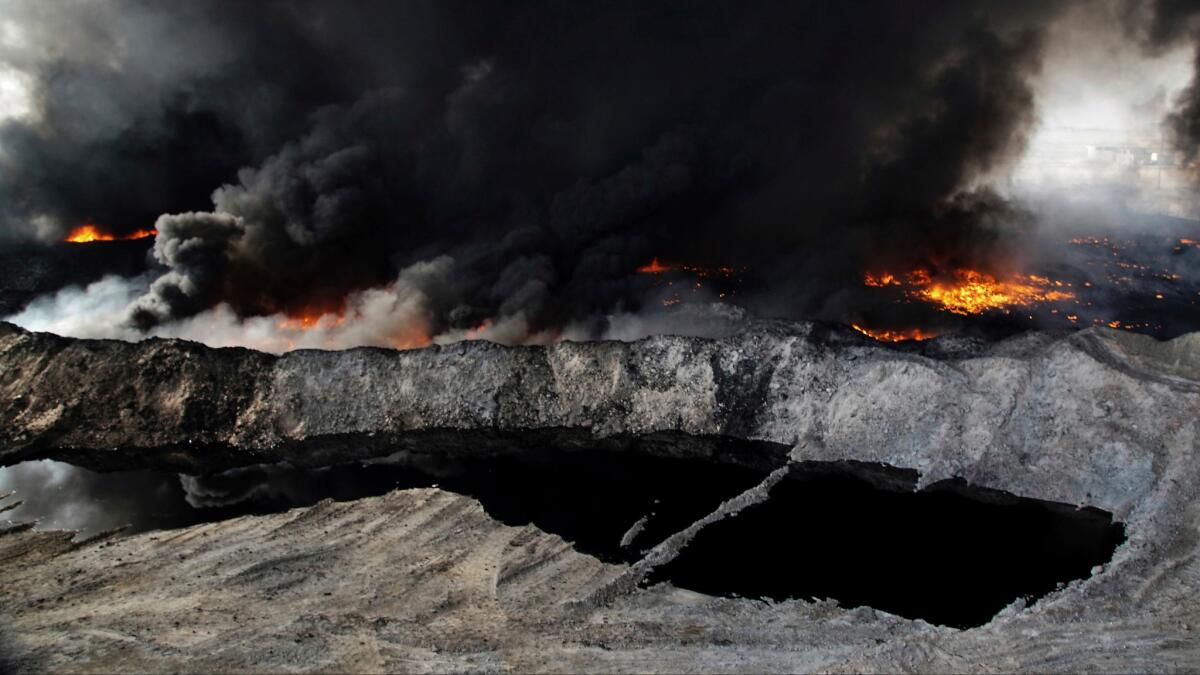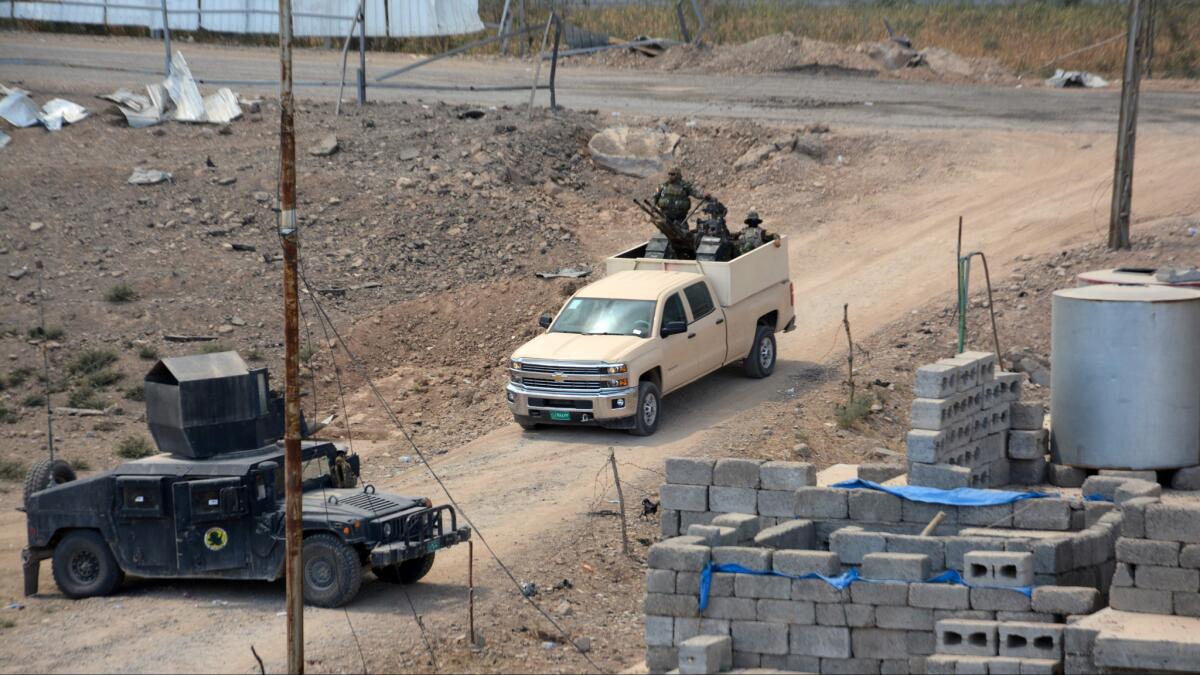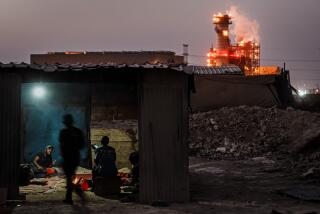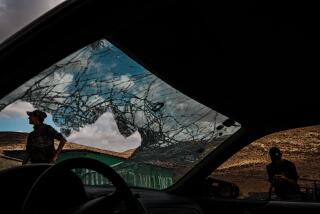In Iraq, punishing family ties to Islamic State and compensating victims of the violence
Reporting from Qayyarah, Iraq — The Iraqi army general spoke calmly with tribal leaders in the oil town of Qayyarah, while delivering his message in no uncertain terms.
The military had received reports of several homes being destroyed — blown up, actually — because some residents or their relatives had suspected ties to Islamic State, said Gen. Karim Shoeyli, deputy commander of the army’s Nineveh Operations Command.
Such retribution after government forces backed by a U.S.-led coalition pushed out extremist fighters was unacceptable, Shoeyli told about 15 leaders during a recent meeting outside the town’s Ministry of Interior building.
“It is not the duty of anyone -- security official, civilian or sheik to do this,” Shoeyli said. “You’re not in a jungle. What you blew up will not change what happened.”
But one tribal leader angrily interrupted as the general spoke about patience and faith in the law.
“Daesh blew up our houses. I have no house, and their families are living there happily,” he said, using an Arabic acronym for Islamic State.
“This guy from Daesh, he killed my three brothers, and my uncle, and I saw him hit my mother,” said the leader, who did not want his name published for safety reasons. “You expect me to accept seeing his son and his wife in front of me?”
In Qayyarah, a town of about 15,000 people less than 20 miles south of Mosul, Islamic State’s self-declared capital, and elsewhere, tension exists in part because the families of some extremist fighters remained after the government regained control of the area. Relatives of extremists have taken some blame for the destruction wreaked upon the town, and many residents see no reason to stop holding them responsible even if they have done nothing wrong.

The town, so rich in oil that its name is derived from the Arabic word for “tar,” had remained under Islamic State control for more than two years. It fell to the group in June 2014 during a blitz offensive that marked the rise of the group’s self-proclaimed caliphate - and made Qayyarah its treasury. At its peak, residents said, more than 60 oil tankers per day were filled to sell on the black market.
Islamic State also recruited and worked with local tribesmen sympathetic to its cause. According to humanitarian organizations and residents, extremists helped subjugate the population through summary executions, rape and confiscation of property.
Then, as they fled government forces in August, Islamic State fighters found another use for the oil, setting fire to the nearby wells to create a smokescreen.
Weeks later, the fires still raged, leaving a layer of soot that turned the entire town — buildings, birds, the sheep grazing in the field - a palette of gray.
In the aftermath of Islamic State’s departure, with a lack of judges and state structures to determine violations of law or punishment, people have turned to tribal law, a system of codes that works in tandem — or overrides — the state judiciary.
“This is a major social issue. The government’s official position, which it communicated to all parties, is that it does not accept any violation of human rights or actions outside the law,” Hussein Adeli, a consultant to the Iraqi government’s National Reconciliation Committee, said in a phone interview.
The tribal law punishment has centered around diyyah, financial compensation to victims or their families in cases of murder, bodily harm and damage of property. Its scope and amount is determined by tribal sheiks acting as adjudicators. In return, the victims’ families agree to not take revenge against the other tribe.
But the system has been strained by the scale of violations attributed to Islamic State; what worked to punish someone who stole his neighbor’s cow may not work when an Islamic State fighter confiscated his neighbor’s house and slaughtered his family members.

“Many of the tribal mechanisms that are used by communities to manage social tensions and promote reconciliation are overwhelmed,” Lise Grande, the U.N. humanitarian coordinator for Iraq, said in a phone interview.
“Families are looking for — they expect — compensation for relatives who have been killed, injured or violated,” Grande said. “They also expect compensation for property that’s been appropriated or destroyed.”
The power of tribal leaders is also tied to their custodianship of the diyyah process. This, along with the percentage the sheiks receive of every diyyah paid, motivates them to push for the highest compensation possible. It has made returning to an area impossible for some families.
“If you’re a family trying to get home, you’re worried about whether you will be compensated or whether you will have to pay compensation,” said a senior Western diplomat, who asked for anonymity to avoid alienating any of the parties. “If the amount you are told to pay is very large, you are going to have to figure out how to extract resources from other parts of the community.”
If a sheik fails to negotiate a high diyyah, gangs may step in, offering to kidnap someone to extract a higher ransom - but pocketing a 60% cut, the diplomat said.
In cases where a diyyah cannot be negotiated, some injured parties have been granted evictions of those related to Islamic State collaborators, even if they have no connection to the offenses.
Such issues arise in many towns. Last month in Duluiya, 55 miles north of Baghdad, police announced through loudspeakers that “families with Daesh members would have to leave,” according to a resident whose brother had run errands for Islamic State.
The man, who did not give his name for fear of reprisals from other residents, said his family went to a tribal leader to severe ties with the brother and obtained legal documents from the government disassociating the family from him.
Those with relatives associated with Islamic State who have not taken the necessary steps to stay in their homes, find themselves in limbo, he said. They may also find themselves barred from staying in other provinces, where authorities view them as security risks.
“They tell you, ‘Your areas are liberated, you’re not allowed to stay here.’ They go to Samarra, Baghdad, it’s the same thing. So where should they go, to areas of Daesh?” the resident said. “And then Daesh slaughters them.”
Bulos is a special correspondent.
More to Read
Sign up for Essential California
The most important California stories and recommendations in your inbox every morning.
You may occasionally receive promotional content from the Los Angeles Times.











